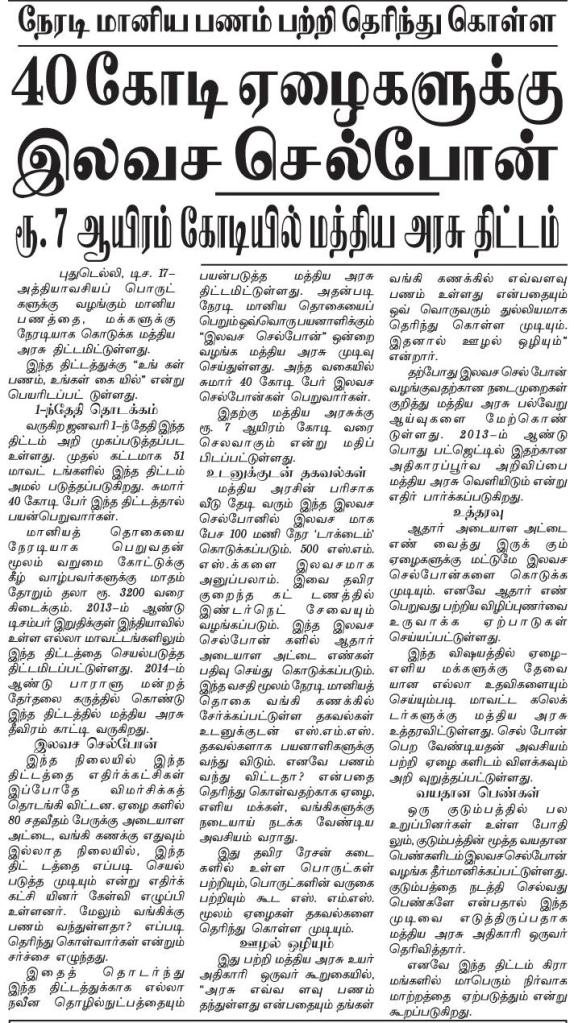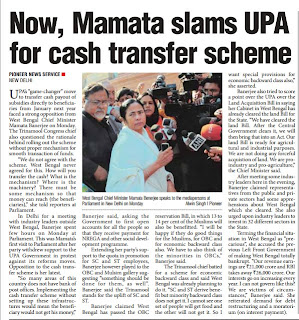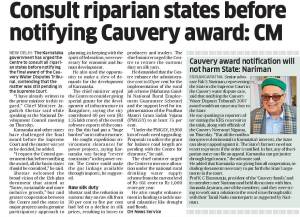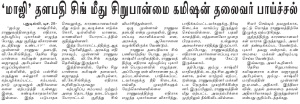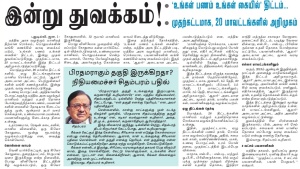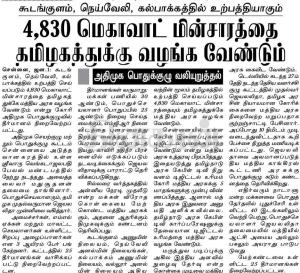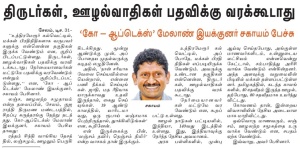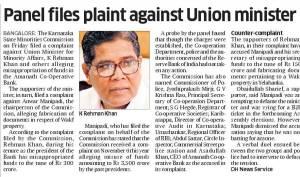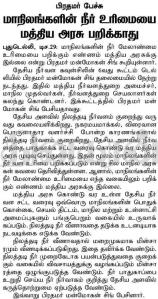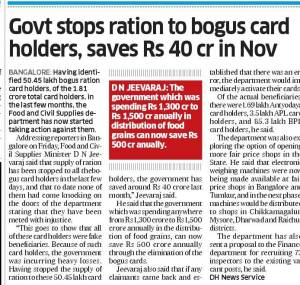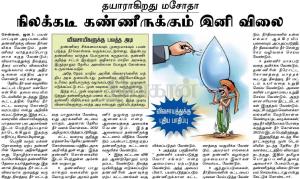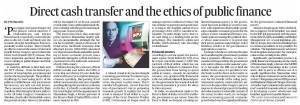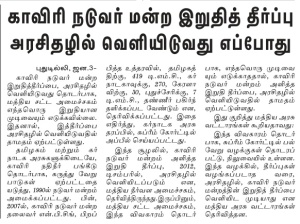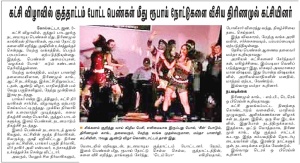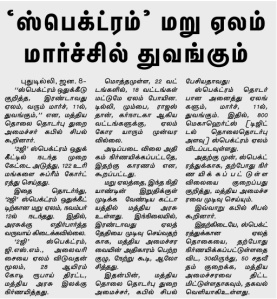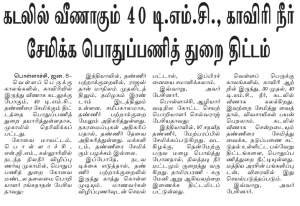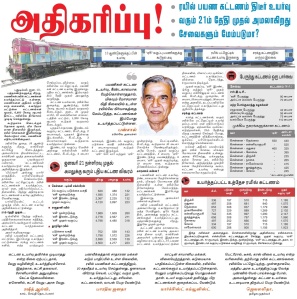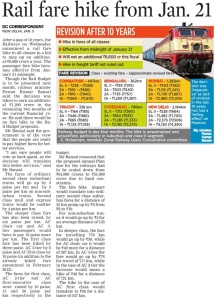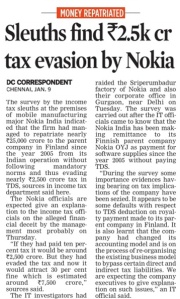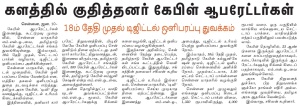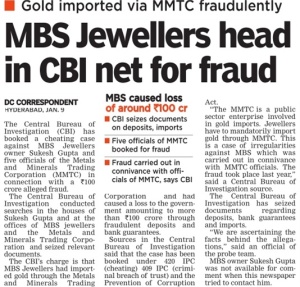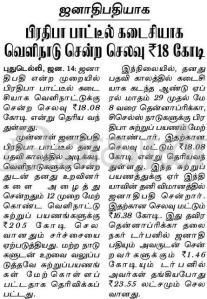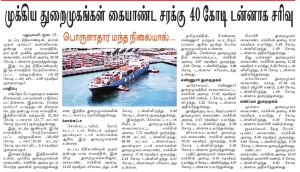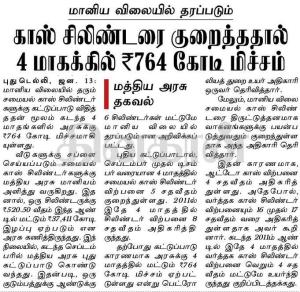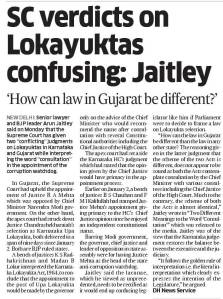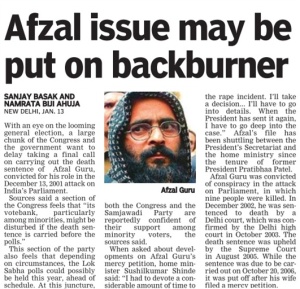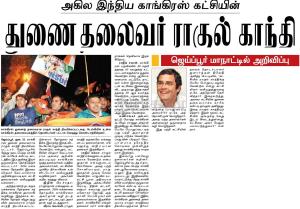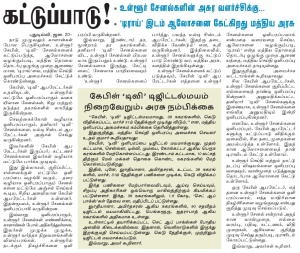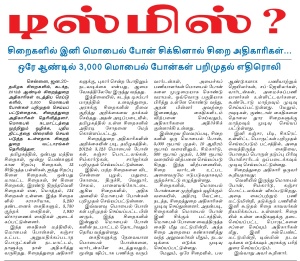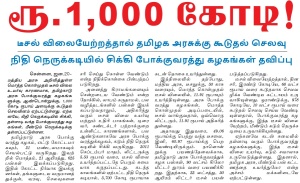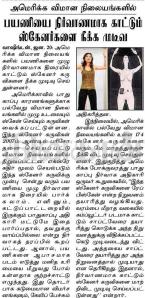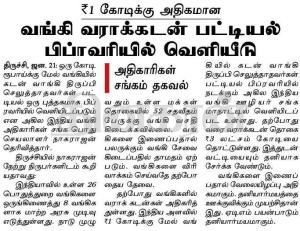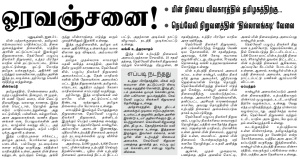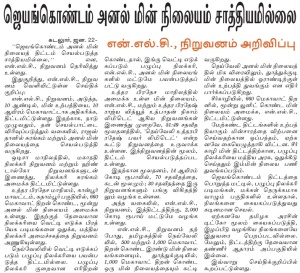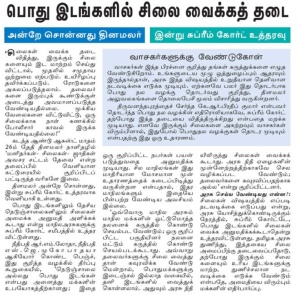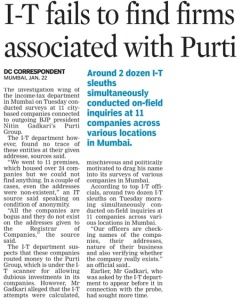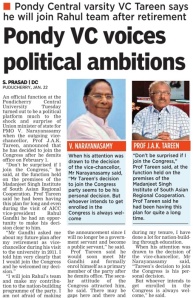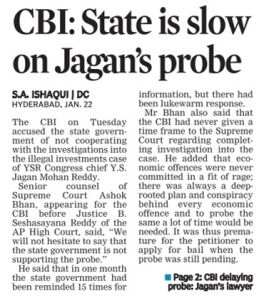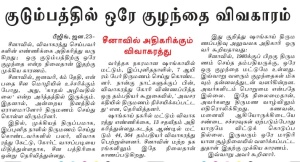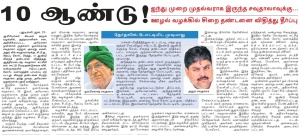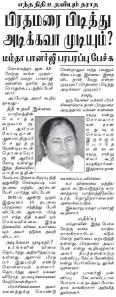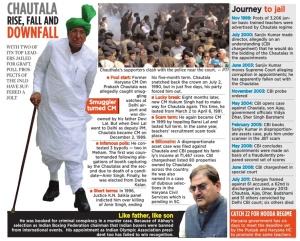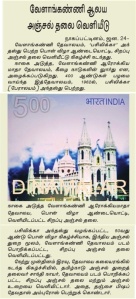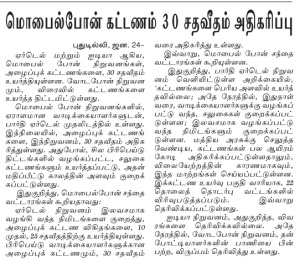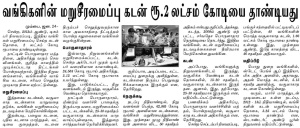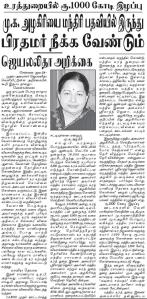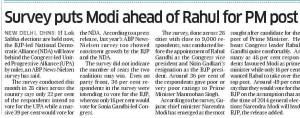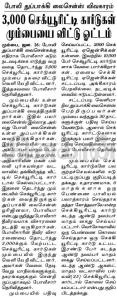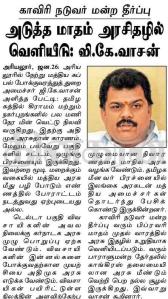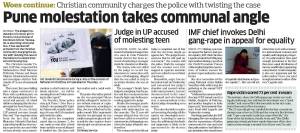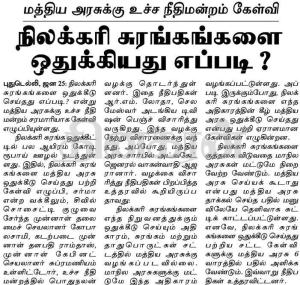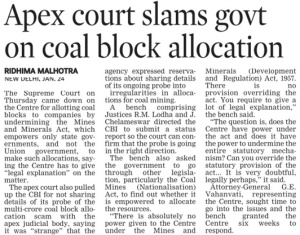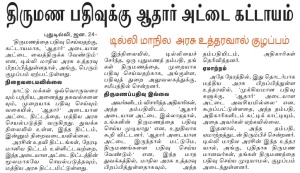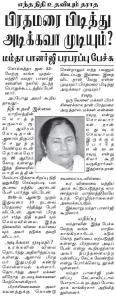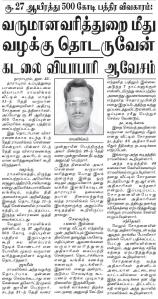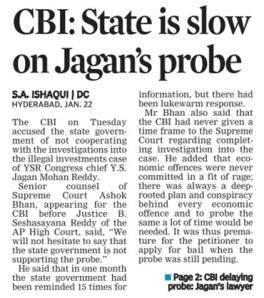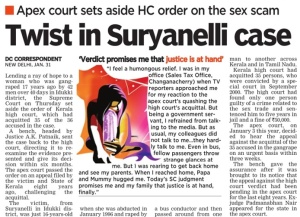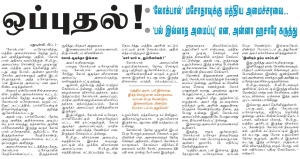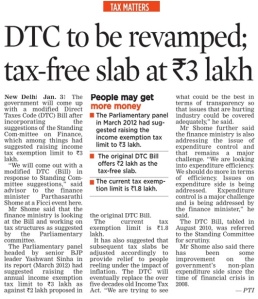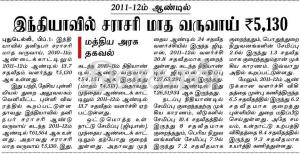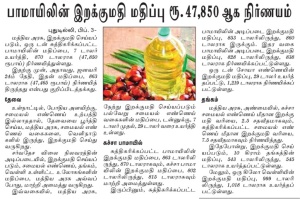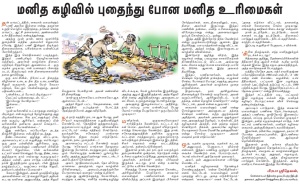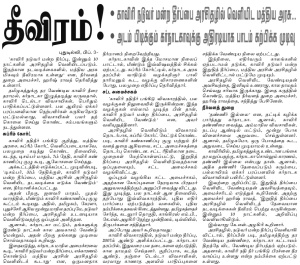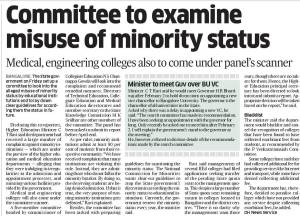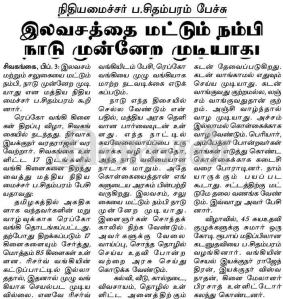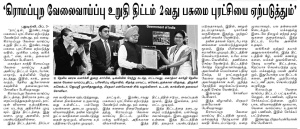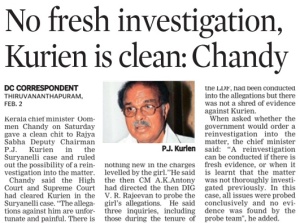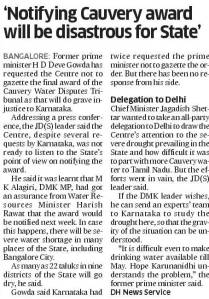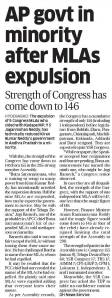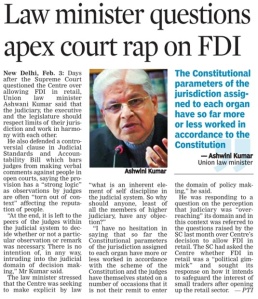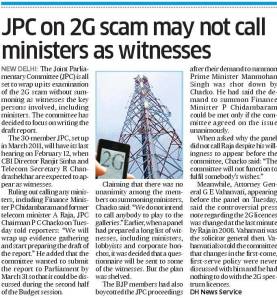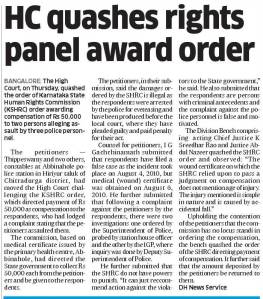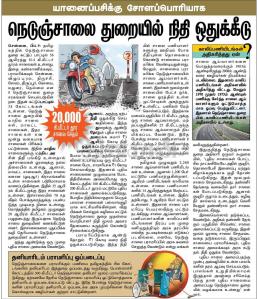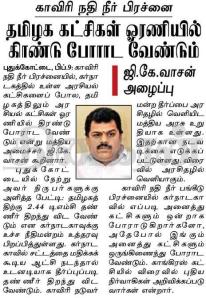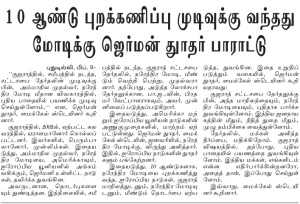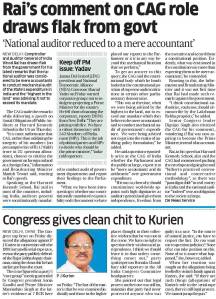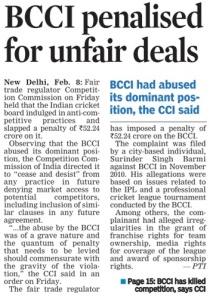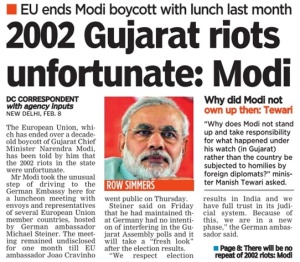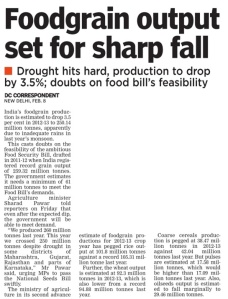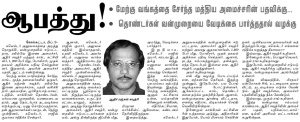Every citizen of India, that is Bharat, governed by dharma should report his or her wealth for abhyudayam (welfare) of the nation. Failure to do so makes such wealth illicit wealth. Equitable and just governance by Rajadharma, demands that such wealth should be nationalised.
‘Black money’ is unreported wealth and P-Notes are illegal instruments (derivatives)
'Black money' can be defined as Nation's Wealth not available for equitable development of a nation
For example, wealth reported as belonging to Rajiv Gandhi in Schweizer Illustriete expose but not reported to Indian authorities is black money.
The legal heirs of Rajiv Gandhi (namely, Sonia Gandhi, Rahul Gandhi) have a responsibility to bring the wealth into the nation's financial system. Their failure to do so should result in the nationalisation of such wealth as illicit wealth and appropriated into the Consolidated Fund of India to be used for social development projects truly honoring the memory of the late Prime Minister of India.

The text below Rajiv's photo reads: Rajiv Gandhi, Indian, Holds 2.5 billion Swiss Francs
(equivalent to Rs. 13,200 Crores in 1991).
Link To The Magazine http://www.schweizer-illustrierte.ch/search/apachesolr_search/november%201991%20die%20konten%20diktatoren
Link To The PDF Download http://www.schweizer-illustrierte.ch/sites/default/files/SI-46-1991-Seiten-38-41.pdf
Annexure 10: Extracts from magazine Schweizer Illustrierte of Nov. 11, 1991, issue regarding Rajiv Gandhi’s numbered Swiss bank a/c amounting to 2 billion dollars. http://www.janataparty.org/annexures/ann10p43.html

‘Black money’ can be defined as unreported, undisclosed wealth. ‘Black money’ is not merely related to monies on whichtaxes were not paid. The ‘black money’ has a devastating negative effect on the nation’s economic advancement since the money is kept mostly abroad – used for the benefit of the foreign financial system -- and hence not available for investments within the country in a sustainable and regulated manner.
Section 132 of Income Tax Act, provides for confiscation of concealed income. What the IT department has revealed during the last two financial years as Rs. 19,938 crores of confiscated income, the amount is clearly only a tip of the iceberg.
Directorate of Transfer Pricing has detected mispricing of Rs. 67,768 crores in the last two financial years Transfer pricing is the amount charged by one part of a business for providing goods or services to another part for calculating profit and loss.
A large segment of the economy, of about 11 percent, relates to real estate transactions which help park unaccounted wealth. Stamp duties are a high 5%. Transaction costs related to the following are also high: advertising, commissions, registration, and contingent costs related to title disputes and litigation.
Unaccounted wealth routed through post box companies in tax havens like Mauritius
A major source of unaccounted wealth comes from post box companies in Mauritius, Cayman Islands or British Virgin Islands. A good example of abuse of corporate structure to account for such illicit wealth is the transfer of US$ 11.2 billion through a single share of a Cayman Islands company, for the sale of business operation of Hutchinson Group in India in Feb. 2007 to Vodafone. Cayman Islands law did NOT require to produce the accounts of the said company. Thus, US$11.2 billion became unaccounted wealth.
A corollary misuse of illegal procedures can also be cited. The illegal procedures were ‘legalised’ by P. Chidambaram despite RBI objections. The procedures relate to Participatory Notes (P-Notes). In India, only RBI is authorized to issue currency notes. P-Notes get used as a super-form of currency notes. P-Notes are instruments issued by Foreign Institutional Investors (FIIs) the major conduits for the much-vaunted FDI flows into the stock markets of India. These P-Notes are used as investments in Indian stock markets without registering themselves with the market regulator (SEBI). In 1992, SEBI permitted FIIs to register and participate in the Indian stock market.
Though originally meant only to attract monies from foreign entities, local PEPs (Politically Exposed Persons) and looters of the nation’s wealth use the P-Notes by sending Indian Rupee wealth through hawala routes abroad and re-route the wealth as P-Notes without having to report who the owners of the instruments are. This is a scandalous violation of the basic principle of financial propriety called in Banking circles as ‘Know Your Client’ Principle. Since the holders of P-Notes are NOT identified, even a smuggler, drug trafficker or a terrorist can enter the Indian stockmarkets through the P-Notes route to influence and play crime games in the stock markets.
The P-Notes are thus offshore derivative instruments provided as a criminal, illegal method to create and transact in black money. Indian-based brokerages among the FIIs buy India-based stocks and then issue P-Notes to ‘foreign’ investors. The ‘foreign’ is in inverted commas because there is no regulation to enforce that they are exclusively ‘foreigners’. Any dividends of capital gains collected from the underlying stocks or securities go back to the mysterious, unidentified ‘investors. This is how most of FDI operates in India, mostly through the Mauritius tax haven route.
P-Notes is an illegal instrument because, the instrument allows large hedge funds to carry out their operations without disclosing their identity. P-Notes are virtually like currency notes, they are contract notes transferable by endorsement and delivery. Such a procedure makes it very difficult for Enforcement Directorate to track down and bring to book the culprits engaged in acts such as money laundering, crime money or illicit wealth received from undisclosed sources (usually corruption money punishable under the Prevention of Corruption Act, 1988). We have already seen how money laundering occurs by using the hawala and P-Notes to re-route the wealth into the nation’s stock markets.
Don't tighten but ban P-Notes
SEBI has no way of knowing who owns the underlying securities and hedge funds held as P-Notes. In the recent years since 2007, a large percentage, of over 50% of FII investments are accounted for by P-Notes. A crash in Sensex was engineered in October 2007 when P. Chidambaram rescued the markets by declaring that P-Notes would not be banned, though SEBI had earlier hinted that P-Notes would be phased out.
The so-called tightening of reporting norms for P-Notes is an eye-wash and has not resulted in any step forward to remove these illegal instruments from the nation’s financial system. See the recent report (June 2012):
Sebi tightens reporting norms for participatory notes
BS Reporter / New Delhi Jun 09, 2012, 00:57 IST
The Securities and Exchange Board of India (Sebi) has tightened the rules governing participatory notes (P-notes) by cutting the time lag in reporting these transactions.
According to a circular issued yesterday, Sebi said foreign institutional investors (FIIs) will have to report monthly details of transactions done through P-notes within 10 days. Earlier, FIIs had a window of six months to report these transactions. The first such report will be for the month of October 2012, by November 10, 2012.
“FIIs issuing ODIs/PNs shall submit details of ODI/PN transaction report (Annexure A, B and C), along with the monthly summary report by 10th of every month for the previous month’s ODI transactions,” it said.
LEAVES LITTLE ELBOW ROOM
Squeezes window for reporting P-note transactions to 10 days from six months earlier
Move follows concerns raised by recent white paper on black money
May drive more investors to QFI route
Three annexures provide the format for reporting P-note activity, details of transactions and assets under management, respectively, under the heads of equity, debt and derivatives.
“The move would increase transparency. It is part of the regulator’s efforts to identify and monitor the beneficial owners of the shares held as closely as possible,” said C R Sasikumar, managing director and chief executive officer, SBI-SG Global Securities Services.
The Sebi move comes weeks after a white paper on black money by the central government identified P-notes as one of the routes through which illicit money transferred outside India returns here through a process called ‘round tripping’.
P-notes or overseas derivative instruments (ODIs) issued by FIIs are popular among foreign investors, since they allow these to earn returns in the Indian market without undergoing the significant cost and time implications of directly investing.
“These instruments are traded overseas outside the direct purview of Sebi surveillance, thereby raising many apprehensions about the beneficial ownership and the nature of funds invested in these instruments. Concerns have been raised that some of the money coming into the market via PNs could be unaccounted wealth, camouflaged under the guise of FII investment,” the white paper said.
The six-month lag in reporting was identified by some market participants as one of the factors affecting Sebi’s surveillance efforts. “The six-month lag in the information available is likely to reduce the strength of corrective action that can be taken by Sebi. These regulations thus, need to be modified to ensure information on downstream issuances is collected for the most recent month. This would ensure active surveillance and timely intervention as and when required by Sebi,” a market participant had said in a recent internal note on P-notes.
During the transitional phase, Sebi has allowed the reports for the months of December 2011 to April 2012 to be held with the existing six months’ lag.
For the months between May to September 2012, the transaction reports shall be given by November 10, the circular added.
http://www.business-standard.com/india/news/sebi-tightens-reporting-norms-for-participatory-notes/476781/
Source: http://profit.ndtv.com/news/market/article-black-money-white-paper-ten-things-to-note-304737
The illegality of P-Notes should be recognized by Indian Parliament and a total ban on P-Notes should be imposed so as not to allow the type of financial crisis created for the Tiger Economies during the 1960’s by irresponsible market operations by FIIs who care little for India’s economic development and are interested in only making profits for themselves.
Using India's wealth for India's development and nationalisation of black money
Two aspects are discussed: 1. Creating Indian Ocean Community to increase the sustainable wealth of nations of the Community; 2. Nationalisation of black money
Section 1: Creating Indian Ocean Community to increase the sustainable wealth of nations of the Community
A remarkable snapshot presents the civilizational history of the globe over the last 2000 years which has impacted adversely the equitable distribution of wealth to all the people of the world. The snapshot presented below shows about even upto the year 1700 India and China with large populations were the dominant contributors to the productive wealth of the world. What happened during the last 400 years since 1700 need not detail us for long. It is a saga of colonial loot of unprecedented order together with the denial of access to technologies to large populations rendering them into a state of poverty.
One solution to quicken the march towards restoring the present-day poor nations such as China, India to the pre-eminent status held by them as major contributors to the world GDP is to form an Indian Ocean Community which will be a veritable economic powerhouse with multi-trillion dollar GDP potential.
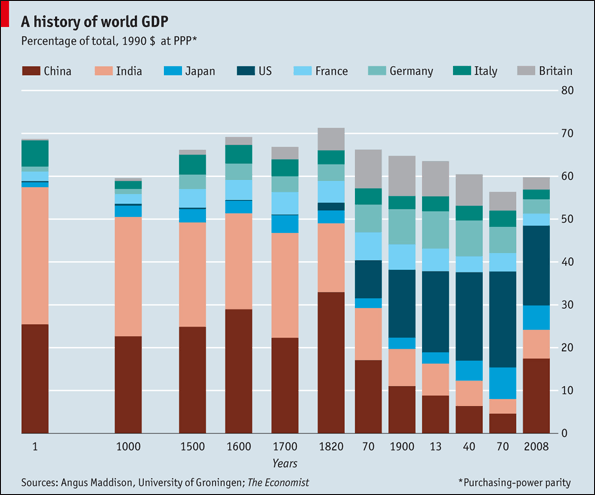
Section 2. Nationalisation of black money
A major factor which slows down the march towards restoration of status of poor nations is the further impoverishment caused by what are today's non-colonial rulers who have forgotten their responsibility to keep the nations not only free but also firmly on the road to development.
One contributory cause for the slow pace of advancement of growth in poor nations is the behavior of Politically Exposed Persons (PEPs), many of whom have now become the wealth-grabbers through corrupt practices and accumulating wealth through unlawful means.
Thus, stemming the creation and accumulation of black money should complement the efforts to forming an Indian Ocean Community.
One way to stop black money accumulation is to nationalise such wealth, on the lines followed by Switzerland for restitution of illicit wealth of PEPs to the poor people of the nations looted by the PEPs.
What happened after the era of colonial regimes (say, since the 1950's -- see the bar chart) is a sordid story of further impoverishment of the people by replacing the colonial loot (with direct participation as colonial regimes) by the proxy colonial loot (with indirect control by an international financial system)mainly by Politically Exposed Persons who have indulged in a-dharma and enriched themselves while impoverishing the people in general and depositing large amounts of illicit wealth in tax havens. This is referred to as 'black money'.
Black money can be simply defined as wealth NOT available to create the wealth of a nation.
Why should large quantities of India’s wealth be kept outside of the nation’s financial system? Such a behavior results in accumulation of black money in what are today the inheritors of past colonial regimes. Accumulation of black money in tax havens only results in colonial powers becoming more powerful and becoming richer while further impoverishing the poor peoples.
The issue is not whether the money is “black” because taxes have been avoided. The issue is that money is NOT available within the nation for developmental investments and hence the wealth is 'black'.
Keeping the wealth within the reach of the people who have helped create the wealth.
Bringing the monies into the nation’s financial system instead of allowing colonial loot to continue in the form of money stashed away in colonial tax havens.
P-notes Instead of RBI issuing Indian currency notes, Morgan Stanley or Fiduciary Investments issue P-Notes as convertible notes without asking any question about who the owners of the P-Notes are. Thus, the P=Note issuers become the Currency issuers with no accountability to the nation’s financial system.
http://www.scribd.com/doc/38995251/Restitution-of-Illicit-Assets-Act-RIAA Federal Act on the Restitution of Assets of Politically Exposed Personsobtained by Unlawful Means Restitution of Illicit Assets Act (RIAA) of 1 October 2010
The Act governs the freezing, forfeiture and restitution of assets of politically exposed persons or their close associates. The Act was applied in enabling restitution of illicit wealth of PEPs (Politically Exposed Persons) like Muamar Gadafi of Libya and Hasni Mubarak of Egypt.
Illicit wealth is made up of assets acquired by unlawful means.
PEPs are a category which includes specifically heads of state or government, high-ranking politicians, high-ranking members of the administration, judiciary, armed forces or national political parties, and senior executives of state-owned corporations of national importance, or natural or legal persons who are closely associated with politically exposed persons for family, personal or business reasons (close associates).
Illicit wealth is presumed to be of unlawful origin if the extraordinary increase is connected with the exercise of a public office by the PEP in a country acknowledged with high level of corruption.
Article 8 of RIAA stipulates the following objectives of the restitution of forfeited assets : a. to improve the living conditions of the people of the country of origin, or b. to strengthen the Rule of Law in the country of origin and to fight the impunity of criminals.
Unaccounted monies held abroad (SC Judgment, July 2011):
Supreme Court WRIT PETITION (CIVIL) NO. 176 OF 2009: Order of Jutice B. Sudershan Reddy and Justice Surinder Singh Nijjar “78.The major problem, in the matters before us, has been the inaction of the State. This is so, both with regard to the specific instances of Hassan Ali Khan and the Tapurias, and also with respect to the issues regarding parallel economy, generation of black money etc. The failure is not of the Constitutional values or of the powers available to the State; the failure has been of human agency. The response cannot be the promotion of vigilantism, and thereby violate other constitutional values. The response has to necessarily be a more emphatic assertion of those values, both in terms of protection of an individual’s right to privacy and also the protection of individual’s right to petition this Court, under Clause (1) of Article 32, to protect fundamental rights from evisceration of content because of failures of the State. The balancing leads only to one conclusion: strengthening of the machinery of investigations, and vigil by broader citizenry in ensuring that the agents of State do not weaken such machinery.”
http://www.docstoc.com/docs/document-preview.aspx?doc_id=135961614
Unaccounted monies held abroad (SC Judgment, July 2011)
Published: November 10, 2012 02:22 IST | Updated: November 10, 2012 02:22 IST Centre puts on hold court direction to form SIT on black money J. Venkatesan It has been more than a year since matter was referred to three-judge Bench The Supreme Court’s directions to the Centre in the ‘black money case,’ including for setting up a special investigation team to go into all issues, are to be examined by a three-judge Bench. Until a decision is rendered by the Bench, these directions will be put on hold, the government has said. It has now been more than a year since the court gave a split verdict on the Centre’s application seeking recall of its order on black money and referred the matter for a fresh hearing by three judges. Acting on petitions filed by the former Union Law Minister Ram Jethmalani and others, a Bench of Justices B. Sudershan Reddy (since retired) and S.S. Nijjar had on July 4, 2011 ordered constitution of the SIT headed by a retired Supreme Court judge B.P. Jeevan Reddy. The court pulled up the Centre for not showing seriousness in bringing black money stashed away by Indians abroad. “The volume of alleged income taxes owed to the country, as demanded by the Union of India itself, and the volume of monies, by some accounts $8.04 billion, and some other accounts in excess of Rs. 70,000 crore, are said to have been routed through various bank accounts of Hassan Ali Khan and the Tapurias. Further, from all accounts, it has been acknowledged that none of the named individuals has any known and lawful sources for such huge quantities of monies.” The court said: “All of these factors… ought to have immediately raised questions regarding the sources being unlawful activities, national security, and transfer of funds into India for other illegal activities, including acts against the state…. However, there is still no evidence of a really serious investigation… from the national security perspective.” On July 15, 2011, the Centre filed an application for recall of the order stating it was passed without jurisdiction. “The order impinges upon the well settled principle that courts do not interfere with the Economic Policy which is in the domain of the Executive…” It also “impinges upon the principle that in matters of utilities, tax and economic policy, legislation and regulation cases, the court exercises judicial self-restraint if not judicial deference to the acts of the Executive…” The wide-ranging criticism of the state were uncalled for, the Centre said, adding the constitution of a SIT and the consequential directions could not be implemented. In September last year, a Bench of Justices Altamas Kabir (now Chief Justice of India) and Nijjar gave a split verdict on the Centre’s application. Justice Kabir said: “Justice does not transcend all barriers and rules of procedure, nor technicalities can stand in its way, particularly if the implementation [of the July 4, 2011 order] would result in injustice. The Supreme Court had the inherent powers to correct injustice.” Justice Nijjar, however, said: “In the present case, there is no question of mistaken facts, being presented by anyone to the court. The application also fails to indicate any miscarriage of justice or injustice which would be caused to any particular class.” The application, though described as one for modification, “is in substance more in the nature of an appeal. At best, it could be said to be in substance an application for review. It certainly does not lie within the very narrow limits within which this court would entertain an application for modification.” The directions, issued after hearing counsel for the parties at length and on numerous dates, could not be recalled on an application seeking only a modification of the order. “The application is dismissed,” said Justice Nijjar. http://www.thehindu.com/news/national/centre-puts-on-hold-court-direction-to-form-sit-on-black-money/article4082190.ece?css=print Black money of illicit wealth such as those of Hassan Ali, or Tapuria, illicit wealth held in tax havens by the legatees of the late Rajiv Gandhi (namely, Sonia Gandhi, Rahul Gandhi) and all the nationalised wealth of PEPs in tax havens should be brought into the nation's financial system FORTHWITH, if necessary, by issuing a national ordinance the way privy purses were nationalised or the way private banks were nationalised. After such a nationalisation, the onus of proving that the wealth was obtained by lawful means should be with the account holders. The constitution of SIT under Supreme Court supervision as spelt out in the July 2011 Judgement of the SC should be a welcome first step. As the nation's justice system grinds on its own pace, let us hope 1. that there will be some alacrity not to deny justice by delaying justice and 2. that the three-judge Bench of SC fully endorses the earlier July 2011 Court order by the 2-judge bench of Jutice B. Sudershan Reddy and Justice Surinder Singh Nijjar. Useful links: http://mrv.net.in/index.php?option=com_content&view=article&id=246:how-indian-black-money-in-swiss-banks-can-be-brought-back&catid=3:global-economy&Itemid=3 How Indian black money in Swiss banks can be brought back http://www.rediff.com/business/column/column-will-congress-and-bjp-defend-the-honour-of-rajiv-gandhi/20120625.htm Will Congress & BJP defend the honour of Rajiv Gandhi?http://www.rediff.com/business/column/column-is-this-why-dmk-supported-pranab-mukherjee/20120704.htm Is this why DMK supported Pranab Mukherjee?






